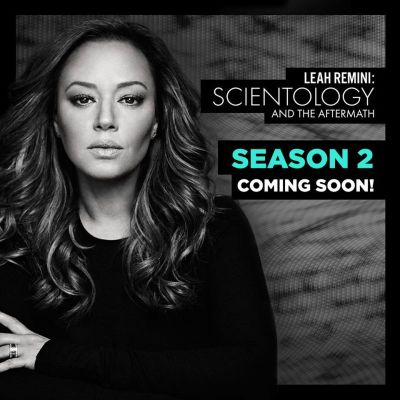Church of Scientology Drives Members to Suicide, Torments Mentally Ill, Leah Remini Docu-Series Reveals

The Church of Scientology torments those suffering with mental illness and has driven several people to suicide, season 2 of actress Leah Remini's acclaimed A&E docu-series "Scientology and the Aftermath" revealed Tuesday night.
Together with former Scientology executive Mike Rinder, Remini unpacked how the Church of Scientology (COS) drove several people to suicide and torments mentally ill individuals, promising Scientological solutions as the cure.
Remini and Rinder also noted that they continue to receive calls from former Scientologists who are crying out for help because they, too, were sexually abused in similar ways as those interviewed for the first episode. Yet a majority of the people who reached out to them were unwilling to go public, fearing severe repercussions from the organization.
The two explained that the COS regards psychiatry and any kind of mental health counseling as fundamentally flawed and not to be trusted. L. Ron Hubbard, who developed Scientology and lauched the cult in 1954, hated psychiatry. For parishioners of the COS with mental issues, the prescribed solution is a Scientology practice called "auditing" where they are hooked up to an e-meter and subjected to questions. These matters are, like everything else, always handled internally. Mental illness is always thought to be caused by someone who is a "suppressive" person or an "enemy" of the COS.

"Scientology promises people that it has the answers to everything," Rinder explained, recounting how Scientologists believe that "all of life, every part of your existence, can be analyzed, resolved and made better by Scientology." The ultimate failure, he went on to say, is when a Scientologist takes his or her own life.
Remini added: "If you are suicidal ... you actually get in trouble for those feelings." People who desire to remain in the COS learn quickly to hide those feelings.
Remini and Rinder interviewed Marie Bilheimer, a former executive in the elite Sea Org whose late husband, Aaron Poulin, committed suicide. Bilheimer was a Scientologist for 28 years, left the Sea Org in 2003 and Scientology altogether in 2010.
Married as teenagers, Bilheimer was serious about following and furthering Scientology while Poulin was constantly breaking the rules, doing silly things that were forbidden under the Church's strict codes, like listening to rapper Eminem and putting sun-in in his hair, which turned the tips of his hair orange. Because of his antics he would be demoted within the church echelons of power while she would be promoted.
Because of the gap in their ranks and seriousness about upholding the religion of Scientology — Poulin increasingly showed signs of wanting the styles of a normal life — Bilheimer's public image was always under pressure. She recounted how senior level people within the COS would encourage her to divorce her husband. But she loved him so she did not.
One night Poulin came home late and told Bilheimer he had pulled over because the weather was foggy and had gotten a ticket. This was not a traffic ticket, she would later find out, but was a citation for prostitution, a matter he would have to go to a court hearing to resolve.
Days later he came home to change clothes to go back to work and kissed her goodbye. He hung himself that night in a hotel owned by the COS.
The COS tightly controlled the circumstances following his death, and when officials told Bilheimer what had happened, she broke down sobbing and started screaming. They were outside the hotel with a whole group of COS leaders, all of whom abandoned her in her sorrow; not one consoled her. They refused to allow her to see her husband's body. The organization was simply interested in seeing that she answered to police in a way so as to minimize potentially negative public relations. Such an effort is deliberate, Rinder explained, known in Scientological terms as a "shore flap."
She was forced to go back to work, and cried at her corner desk. She wasn't allowed to talk about her husband's death. The COS summarily spread a fake story that he had left the Sea Org, and made Bilheimer feel as though his suicide was her fault. They forced her to undergo auditing sessions where she was interrogated as to what she might have done to cause him to have these suicidal thoughts.
"He was trapped. And for years I felt a responsibility and I felt the blame, and I felt that I had missed it — that he did it because of me because I was so dedicated and he didn't have anywhere to turn to," Bilheimer said.
Remini explained that COS is essentially a compassion-free zone. Rinder observed that the outpouring of love Scientologists receive from non-Scientologists once they leave the cult is "astonishing."
Remini and Rinder also interviewed Lauren Haggis, daughter of Paul Haggis, an acclaimed producer, writer, and director who was one of the first Hollywood celebrities to go public about leaving Scientology. Lauren Haggis was a Scientologist for 22 years before finally leaving in 2006.
Haggis recounted the story of her "firecracker" friend Tayler Tweed who shot and killed herself in January 2014. The two knew each other from the Delphi Academy, a Scientology school they both attended during their youth.

Although the two women lost touch when Haggis went to college they reconnected on Facebook. By all appearances it looked as though Tweed was thriving, posting photos where she was smiling and loving life as a volunteer minister with the COS in Japan and elsewhere.
But something turned for her, Haggis recalled.
"It started with a boyfriend who broke up with her and was really negative and nasty," Haggis explained, noting how he and other fellow Scientologists were calling her cruel names, breaking down her character.
Tweed reportedly made several attempts to address this within the proper channels of the COS for several months to no avail.
Out of utter frustration she went public, venting and railing against the organzation on Facebook.
"This is what an angry #SecondGeneration #Scientologist looks like," read one post. "I want to die before 2014. That's not good, right?" read another. She posted pictures of herself weighing 95 pounds, describing her time in Scientology as "17 years of torture."
Fellow Scientologists were vicious in return, covering for the organization. Her own mother urged people to disconnect from her, telling friends to "unfriend" her on Facebook.
"Scientology does not recognize depression as a mental illness," Rinder explained.
Haggis wanted to reach out to support her but was too afraid to do so because of the backlash she might receive from other Scientologists.
In November 2013, Tweed's problems appeared to dissipate, according to her Facebook posts. She apologized to the Scientology community for speaking out against them, started a new Facebook page where all of her posts conveyed nothing but positive-sounding things.
Tweed took her own life in January 2014.
The only thing COS had offered her was auditing sessions that didn't help and vitamins.
At her funeral, Tweed's mom reportedly said — just one week after her daughter had killed herself — "I am at peace with my daughter's decision."
Such an expression of emotionless grief "is a microcosm of the Scientology prison of belief and mindset that makes it acceptable to destroy someone for the 'greater good'" Rinder said.
Remini urged viewers: "You have step up, you have to take responsibility for what you're saying to people. The mental health profession should have an issue with Scientology promoting itself as the cure for mental illness. It is not a cure."
Haggis noted that of the five people she knew who had taken their own lives, four were Scientologists.




























